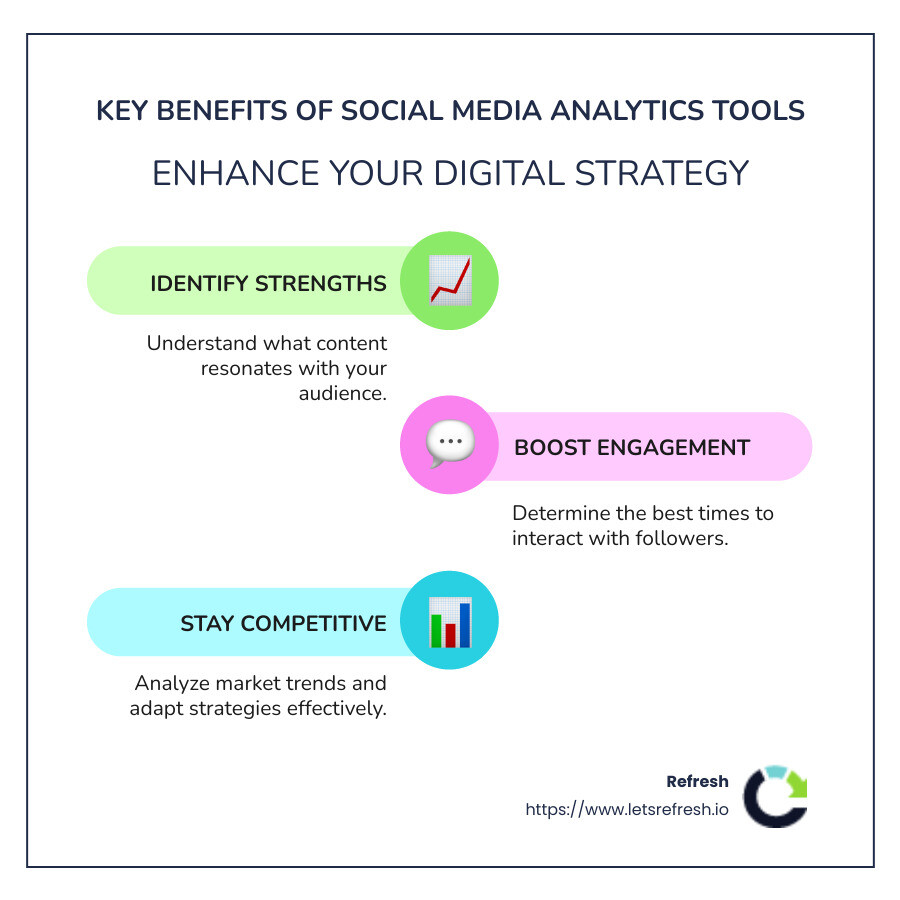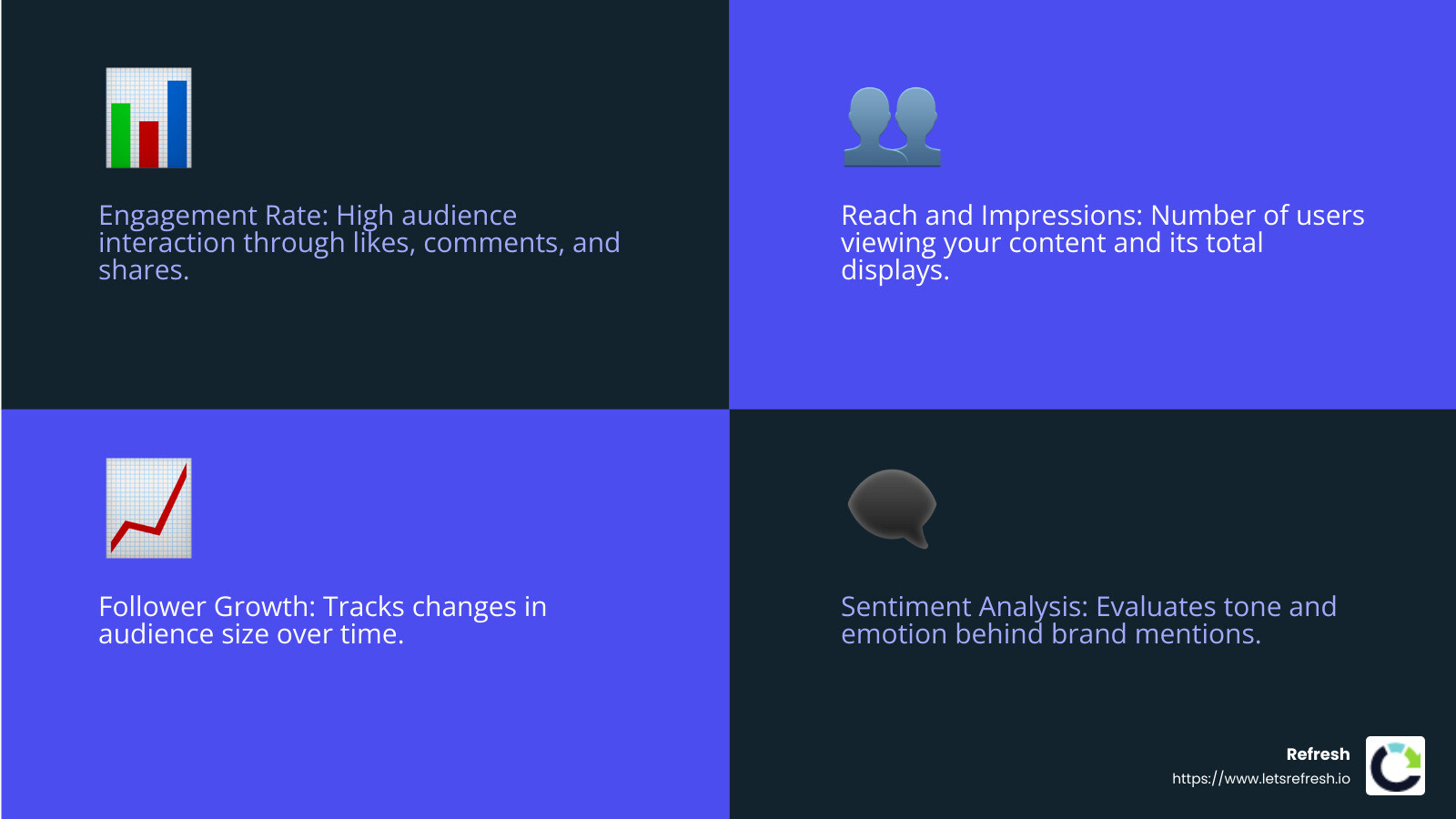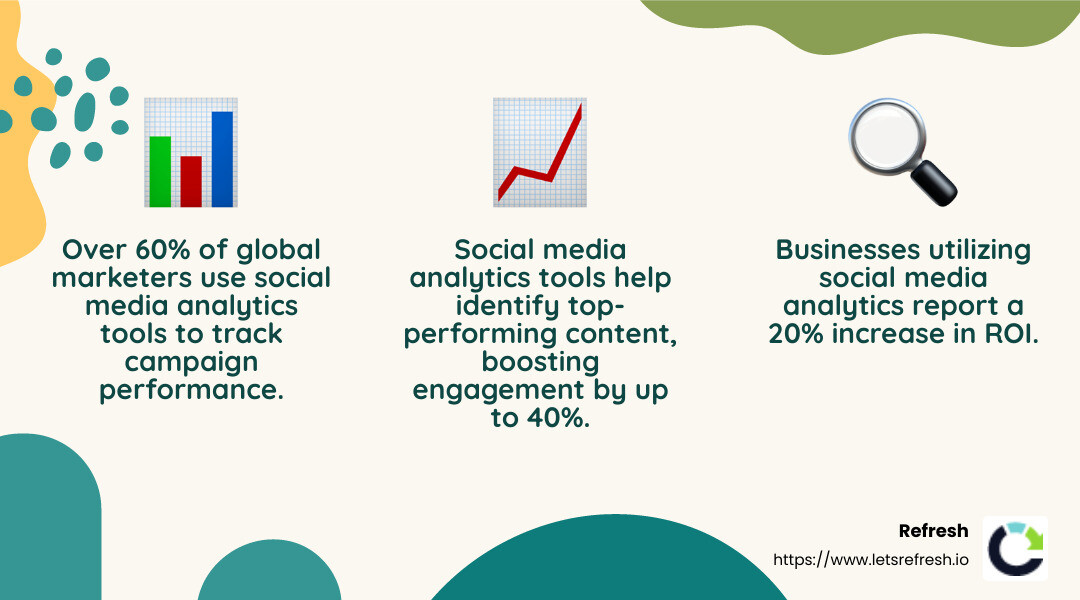July 24, 2025
Social media analytics tools are the secret weapon for any tech-savvy business aiming to grow its digital presence. In today's digital world, these tools hold the key to understanding your audience and enhancing your marketing strategy. They offer a window into crucial metrics like engagement, audience growth, and overall reach. Here's why they're essential:
- Identify strengths and weaknesses: Learn what content resonates with your audience.
- Boost engagement: Pinpoint the best time to connect with your followers.
- Stay ahead of competitors: Analyze market trends and adapt your strategies.
In the current digital landscape, social media analytics tools drastically simplify the job of monitoring these critical data points. Whether you're creating content that connects or refining your marketing tactics, these insights are invaluable. They empower you to make smart, data-driven decisions that can boost your brand's visibility and engagement.
As Alexander Palmiere, Founder and CEO of Refresh Digital Strategy, I’ve helped numerous businesses open up the potential of social media analytics tools. Through Refresh, my dedication is to support growth-stage companies with powerful web and digital strategies.

Social media analytics tools vocab to learn:
What are Social Media Analytics Tools?
Social media analytics tools are software applications designed to help businesses gather, analyze, and interpret data from their social media platforms. These tools offer insights into how your social media efforts are performing, allowing you to make informed decisions about your marketing strategies.
Purpose of Social Media Analytics Tools
The primary purpose of these tools is to provide a comprehensive understanding of your social media performance. They allow you to:
- Measure Success: Determine which posts are driving engagement and which aren't, helping you refine your content strategy.
- Understand Your Audience: Gain insights into who your followers are, what they like, and how they interact with your content.
- Optimize Campaigns: Use data to adjust your marketing campaigns for better results.
- Benchmark Against Competitors: See how your performance stacks up against others in your industry.
Key Metrics in Social Media Analytics
To make the most of social media analytics tools, it's crucial to focus on key metrics that align with your business goals. Here are some of the most important ones:
- Engagement Rate: Measures how much your audience interacts with your content through likes, comments, and shares.
- Reach and Impressions: Reach refers to the number of unique users who see your content, while impressions count how many times your content is displayed, regardless of clicks.
- Follower Growth: Tracks how your audience size changes over time, indicating the effectiveness of your content in attracting new followers.
- Sentiment Analysis: Evaluates the tone and emotion behind mentions of your brand, helping you understand public perception.
- Conversion Rate: Measures the effectiveness of your social media efforts in driving desired actions, like website visits or purchases.
These metrics provide a clear picture of how well your social media strategies are working and where improvements are needed. By leveraging these insights, businesses can craft more effective campaigns and foster deeper connections with their audience.

Social media analytics tools are not just about collecting data; they're about changing that data into actionable insights that drive success. As you explore these tools, the right metrics will vary based on your specific goals and industry.
Types of Social Media Analytics
Understanding the different types of social media analytics is crucial for crafting a well-rounded strategy. Each type serves a unique purpose, helping you to not only gather data but also to interpret it effectively. Let's break down the key types of analytics you should know.
Descriptive Analytics
Descriptive Analytics is all about summarizing past data to understand what has happened on your social media platforms. It involves metrics like total followers, likes, shares, and comments. Think of it as your social media report card.
For example, if a brand notices a spike in engagement on a particular post, descriptive analytics helps pinpoint what content resonated well with the audience. This type of analytics is foundational, offering a snapshot of your historical performance.
Diagnostic Analytics
While descriptive analytics tells you what happened, Diagnostic Analytics digs into why it happened. It helps identify patterns or anomalies in your data. For instance, if a sudden drop in engagement occurs, diagnostic analytics will help you explore potential causes, such as changes in posting frequency or content type.
Consider it as a tool for troubleshooting your social media strategy. By understanding the "why," you can make informed adjustments to improve performance.
Predictive Analytics
Predictive Analytics uses historical data to forecast future trends. This type of analytics can help you anticipate changes in audience behavior and engagement. For example, if data shows that posts with videos perform better, predictive analytics might suggest increasing video content to boost future engagement.
By leveraging predictive analytics, brands can stay ahead of trends and optimize their content strategies for upcoming campaigns.
Prescriptive Analytics
Taking it a step further, Prescriptive Analytics not only predicts future outcomes but also provides recommendations on actions to take. It's like having a social media coach that guides you on the next best steps.
For instance, if predictive analytics indicates a potential decline in engagement, prescriptive analytics might recommend specific strategies, like altering posting times or experimenting with new content formats, to mitigate the decline.
Quantitative Analytics
Lastly, Quantitative Analytics focuses on numerical data to provide measurable insights. It involves analyzing metrics such as click-through rates, cost per click, and conversion rates.
This type of analytics is particularly valuable for assessing the ROI of your social media efforts. By focusing on hard numbers, you can make data-driven decisions that align with your business goals.
Understanding these various types of analytics empowers you to not only track your social media performance but also to optimize it continually. Each type offers unique insights, helping you to refine your strategy with precision and confidence.
In the next section, we'll explore the top social media analytics tools for 2024, highlighting their features and how they can improve your social media strategy.
Top 12 Social Media Analytics Tools for 2024
Navigating social media can be overwhelming, but the right tools can make all the difference. Let's explore the top social media analytics tools for 2024, each offering unique features to improve your strategy.
Sprout Social
Sprout Social is a powerhouse for managing your social media presence. It offers comprehensive features like cross-channel analytics and advanced listening capabilities. This means you can track performance across platforms and gain insights into audience conversations. Sprout Social lets you understand who your audience is and how they interact with your content.
Buffer
Buffer simplifies content management with a focus on content performance and engagement metrics. It provides insights into audience demographics, helping you tailor content to resonate with your followers. With its intuitive interface, Buffer makes it easy to see which posts are driving engagement.
Hootsuite
Hootsuite is known for its robust scheduling capabilities and analytics. It offers custom reports, allowing you to track key metrics and adjust your strategy accordingly. Hootsuite's ability to integrate with multiple platforms makes it a favorite for businesses looking to streamline their social media efforts.
Zoho Social
Zoho Social provides audience insights and engagement tracking. Its real-time response feature ensures you never miss an opportunity to connect with your audience. Zoho Social is ideal for businesses that prioritize customer interaction and want to foster a loyal community.
Sendible
For agencies, Sendible is a go-to tool with its automated reports and client collaboration features. It offers white-labeling, enabling agencies to present data under their brand. Sendible streamlines the reporting process, making it easier to showcase results to clients.
Keyhole
Keyhole excels in real-time analysis and competitor tracking. It also monitors influencer activity, helping you identify potential partners. With Keyhole, you can keep a pulse on industry trends and adjust your strategy to stay ahead.
Rival IQ
Rival IQ specializes in competitor analysis and social listening. It provides custom dashboards to track specific metrics, offering a clear picture of your social media landscape. Rival IQ helps you understand what’s working for your competitors and how you can leverage that insight.
Iconosquare
Initially an Instagram-focused tool, Iconosquare now offers analytics for multiple platforms. It features custom dashboards and publishing capabilities, making it easy to manage and analyze your social media efforts. Iconosquare is perfect for brands that rely heavily on visual content.
Tailwind
Tailwind is custom for Pinterest and Instagram, offering tools like a hashtag finder and bulk scheduling. It’s designed to optimize your visual content strategy, helping you reach a broader audience on these platforms. Tailwind's focus on visuals makes it a must-have for brands in creative industries.
Google Analytics
While not traditionally a social media tool, Google Analytics is invaluable for tracking website traffic from social media channels. It helps measure conversion rates and the effectiveness of your social media campaigns. With Google Analytics, you can see how social media efforts drive website engagement.
Mentionlytics
Mentionlytics focuses on social listening and sentiment analysis. Its real-time alerts keep you informed about brand mentions and public sentiment. This tool is essential for managing your brand's reputation and responding to feedback promptly.
BuzzSumo
BuzzSumo provides content analysis and tracks social engagement trends. It shows which topics are trending and how your content compares. With BuzzSumo, you can craft content strategies that are informed by the latest industry trends and audience interests.
These tools offer a variety of features to cater to different needs, from content scheduling to in-depth analytics. Choosing the right tool can improve your social media strategy and improve engagement with your audience. Next, we'll explore the benefits of using these analytics tools and how they can drive success in your social media campaigns.
Benefits of Using Social Media Analytics Tools
Deep Insights
Using social media analytics tools offers a wealth of insights into your audience's behavior and preferences. These tools reveal how many people your posts reach, how often they engage with your content, and how your follower base evolves over time. This data empowers you to create content that resonates with your audience and meets their needs.
For instance, knowing when your audience is most active can help you schedule posts at optimal times, ensuring maximum visibility and engagement. This kind of strategic posting can lead to a significant increase in user interaction and brand awareness.
Follower Engagement and Customer Loyalty
When your content aligns with your followers' interests, they are more likely to engage with it. This engagement is not just about likes and comments; it's about building a connection. Engaged followers are more likely to become loyal customers who trust your brand.
By analyzing engagement metrics, you can identify which types of content generate the most interaction. This allows you to replicate successful strategies and foster a community that values your brand. Consistent engagement signals to your audience that you value their input, further strengthening their loyalty.
ROI Optimization
Tracking key performance indicators (KPIs) like click-through rates and conversion rates is crucial for optimizing your return on investment (ROI) in social media marketing. Social media analytics tools provide the data needed to link specific activities to revenue generation.
For example, if you notice a particular post type consistently results in high conversions, you can allocate more resources to similar content. This data-driven approach ensures that your social media strategy is not only effective but also cost-efficient, maximizing the impact of your marketing budget.
Understanding these benefits can help you leverage social media analytics tools to their fullest potential. Up next, we'll guide you on how to choose the right tool for your business needs, ensuring that you get the most out of your social media efforts.
How to Choose the Right Social Media Analytics Tool
Selecting the perfect social media analytics tool for your business can feel overwhelming with so many options available. But it doesn't have to be! Here’s a simple guide to help you make the best choice.
Identify Your Needs
Start by understanding what you need from an analytics tool. Are you focused on tracking engagement metrics, or is competitor analysis more important? Maybe you need to manage multiple social media accounts from one place. Knowing your priorities will narrow down your options.
For example, if you're a small business in Pittsburgh looking to boost local engagement, you might prioritize tools with strong real-time monitoring and demographic insights.
Compare Features
Not all tools offer the same features. Some excel at content scheduling and performance tracking, like Buffer, while others shine in real-time analysis and social listening, such as Keyhole.
Create a checklist of must-have features. Do you need detailed audience demographics or custom report generation? Compare tools based on these criteria to find the best fit.
Budget Considerations
Your budget plays a crucial role in your decision. Prices can vary widely from free options, like Google Analytics, to premium solutions with comprehensive features.
Evaluate what you can afford and prioritize tools that offer the most value for your investment. Sometimes, a slightly more expensive tool can save you time and provide insights that justify the cost.
Trial Periods
Most tools offer a trial period or a free version. Use this opportunity to test the tool’s capabilities and user interface. This hands-on experience is invaluable in determining whether the tool meets your needs.
For instance, HubSpot's Social Media Management Software offers time-saving features to help you prioritize social interactions. Trying out such tools during their trial period can help you assess their effectiveness for your business.
By focusing on these aspects, you can choose a social media analytics tool that aligns with your business goals and helps you succeed in the digital landscape.
Up next, we'll address some frequently asked questions about social media analytics tools to further guide your decision-making process.
Frequently Asked Questions about Social Media Analytics Tools
What are social media analytics tools?
Social media analytics tools are software solutions designed to collect, analyze, and interpret data from social media platforms. These tools help businesses understand the performance of their social media activities by tracking key metrics like engagement, reach, and conversions. The primary purpose is to provide actionable insights that can guide marketing strategies, improve audience engagement, and optimize content for better results.
How to check social media analytics for free?
There are several free tools available to help you track your social media analytics without breaking the bank. Some of these tools are built into the social media platforms themselves, providing essential insights directly from the source.
- Facebook Insights and Instagram Insights: Both platforms offer native analytics for business accounts, showing data on reach, engagement, and audience demographics.
- Twitter Analytics: This tool provides a detailed overview of your tweets' performance, including impressions and engagement rates.
- Google Analytics: While not a social media tool per se, it can track traffic from social media to your website, helping you understand the impact of your social efforts on site visits and conversions.
These free resources allow you to gather important data about your social media activities and make informed decisions about your strategy.
How to pull analytics from social media?
Pulling analytics from social media involves using tools and features that gather data on your social media performance. Here's a simple approach:
- Choose Your Platforms: Identify which social media platforms are most relevant to your business. Each platform offers different insights, so focus on those that align with your audience.
- Use Platform Insights: Use the built-in analytics tools provided by each platform. For example, Facebook Insights can show you how many people your posts have reached.
- Select Key Metrics: Determine which metrics are important for your goals. Common metrics include likes, shares, comments, follower growth, and click-through rates.
- Leverage Third-Party Tools: Consider using third-party tools like Buffer or Hootsuite for more comprehensive analytics. These tools can integrate data from multiple platforms into one dashboard, making it easier to track and compare performance.
By following these steps, you can effectively gather and analyze data from your social media platforms, helping you refine your strategy and achieve better results.

Up next, we will explore the benefits of using social media analytics tools to improve your digital marketing efforts.
Conclusion
As we wrap up our exploration of social media analytics tools, it's clear that these tools are indispensable for any business looking to succeed in the digital world. They offer deep insights into your audience's behavior, improve follower engagement, and optimize your return on investment (ROI). By leveraging these tools, you can make data-driven decisions that propel your marketing strategies forward.
At Refresh, we understand the power of social media analytics in driving business growth. Our comprehensive services not only include SEO and branding but also expert social media management custom to small and medium-sized businesses. We focus on building long-term partnerships, ensuring that your success is our priority.
Our team is dedicated to providing ongoing support and optimization, ensuring your social media strategy is always aligned with your business goals. With expert Webflow support, we ensure your digital presence is not just visually appealing but also strategically sound.
Ready to lift your brand's digital presence? Contact us at Refresh and let's work together to achieve lasting success.
Still have questions? Let’s talk about it.
.avif)





